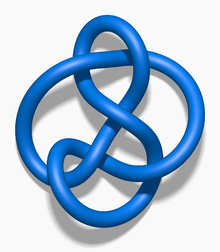6₃ knot
In knot theory, the 63 knot is one of three prime knots with crossing number six, the others being the stevedore knot and the 62 knot. It is alternating, hyperbolic, and fully amphichiral. It can be written as the braid word
| 6₃ knot | |
|---|---|
 | |
| Arf invariant | 1 |
| Braid length | 6 |
| Braid no. | 3 |
| Bridge no. | 2 |
| Crosscap no. | 3 |
| Crossing no. | 6 |
| Genus | 2 |
| Hyperbolic volume | 5.69302 |
| Stick no. | 8 |
| Unknotting no. | 1 |
| Conway notation | [2112] |
| A-B notation | 63 |
| Dowker notation | 4, 8, 10, 2, 12, 6 |
| Last /Next | 62 / 71 |
| Other | |
| alternating, hyperbolic, fibered, prime, fully amphichiral | |
Symmetry
Like the figure-eight knot, the 63 knot is fully amphichiral. This means that the 63 knot is amphichiral,[2] meaning that it is indistinguishable from its own mirror image. In addition, it is also invertible, meaning that orienting the curve in either direction yields the same oriented knot.
Invariants
The Alexander polynomial of the 63 knot is
and the Kauffman polynomial is
The 63 knot is a hyperbolic knot, with its complement having a volume of approximately 5.69302.
gollark: This demonstrates many things:- images (externally linked, admittedly)- the existence of an edit button- URLs which exist- wikilinks with nonexistence checking apioids
gollark: Here is an image from earlier.
gollark: YOU *CANNOT* STOP MINOTEAUR.
gollark: I WILL CONTINUE TO DO THINGS.
gollark: NO.
References
- https://www.wolframalpha.com/input/?i=6_3+knot
- Weisstein, Eric W. "Amphichiral Knot". MathWorld. Accessed: May 12, 2014.
- "6_3", The Knot Atlas.
This article is issued from Wikipedia. The text is licensed under Creative Commons - Attribution - Sharealike. Additional terms may apply for the media files.